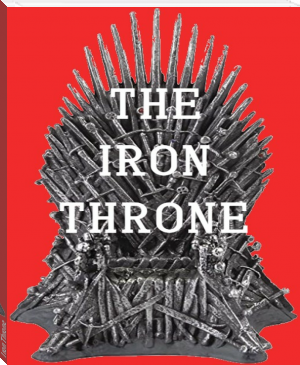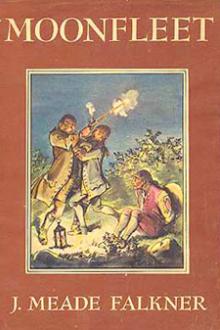Iron Throne - Ellen Gould-Harmon (best autobiographies to read .TXT) 📗

- Author: Ellen Gould-Harmon
Book online «Iron Throne - Ellen Gould-Harmon (best autobiographies to read .TXT) 📗». Author Ellen Gould-Harmon
It was apostasy that led the early church to seek the aid of the civil government, and this prepared the way for the development of the papacy--the beast. Said Paul: "There" shall "come a falling away, . . . and that man of sin be revealed." 2 Thessalonians 2:3. So apostasy in the church will prepare the way for the image to the beast. The Bible declares that before the coming of the Lord there will exist a state of religious declension similar to that in the first centuries.
"In the last days perilous times shall come. For men shall be lovers of their own selves, covetous, boasters, proud, blasphemers, disobedient to parents, unthankful, unholy, without natural affection, trucebreakers, false accusers, incontinent, fierce, despisers of those that are good, traitors, heady, high-minded, lovers of pleasures more than lovers of God; having a form of godliness, but denying the power thereof." 2 Timothy 3:1-5. "Now the Spirit speaketh expressly, that in the latter times some shall depart from the faith, giving heed to seducing spirits, and doctrines of devils." 1 Timothy 4:1. Satan will work "with all power and signs and lying wonders, and with all deceivableness of unrighteousness." And all that "received not the love of the truth, that they might be saved," will be left to accept "strong delusion, that they should believe a lie." 2 Thessalonians 2:9-11. When this state of ungodliness shall be reached, the same results will follow as in the first centuries.
The wide diversity of belief in the Protestant churches is regarded by many as decisive proof that no effort to secure a forced uniformity can ever be made. But there has been for years, in churches of the Protestant faith, a strong and growing sentiment in favour of a union based upon common points of doctrine. To secure such a union, the discussion of subjects upon which all were not agreed-however important they might be from a Bible standpoint--must necessarily be waived.
Charles Beecher, in a sermon in the year 1846, declared that the ministry of "the evangelical Protestant denominations" is "not only formed all the way up under a tremendous pressure of merely human fear, but they live, and move, and breathe in a state of things radically corrupt, and appealing every hour to every baser element of their nature to hush up the truth, and bow the knee to the power of apostasy. Was not this the way things went with Rome? Are we not living her life over again? And what do we see just ahead? Another general council! A world's convention! Evangelical alliance, and universal creed!"--Sermon on "The Bible a Sufficient Creed," delivered at Fort Wayne, Indiana, Feb. 22, 1846. When this shall be gained, then, in the effort to secure complete uniformity, it will be only a step to the resort to force. When the leading churches of the United States, uniting upon such points of doctrine as are held by them in common, shall influence the state to enforce their decrees and to sustain their institutions, then Protestant America will have formed an image of the Roman hierarchy, and the infliction of civil penalties upon dissenters will inevitably result.
The beast with two horns "causeth [commands] all, both small and great, rich and poor, free and bond, to receive a mark in their right hand, or in their foreheads: and that no man might buy or sell, save he that had the mark, or the name of the beast, or the number of his name." Revelation 13:16, 17. The third angel's warning is: "If any man worship the beast and his image, and receive his mark in his forehead, or in his hand, the same shall drink of the wine of the wrath of God." "The beast" mentioned in this message, whose worship is enforced by the two-horned beast, is the first, or leopardlike beast of Revelation 13--the papacy. The "image to the beast" represents that form of apostate Protestantism which will be developed when the Protestant churches shall seek the aid of the civil power for the enforcement of their dogmas. The "mark of the beast" still remains to be defined.
After the warning against the worship of the beast and his image the prophecy declares: "Here are they that keep the commandments of God, and the faith of Jesus." Since those who keep God's commandments are thus placed in contrast with those that worship the beast and his image and receive his mark, it follows that the keeping of God's law, on the one hand, and its violation, on the other, will make the distinction between the worshipers of God and the worshipers of the beast. The special characteristic of the beast, and therefore of his image, is the breaking of God's commandments. Says Daniel, of the little horn, the papacy: "He shall think to change times and the law." Daniel 7:25, R.V. And Paul styled the same power the "man of sin," who was to exalt himself above God. One prophecy is a complement of the other. Only by changing God's law could the papacy exalt itself above God; whoever should understandingly keep the law as thus changed would be giving supreme honour to that power by which the change was made. Such an act of obedience to papal laws would be a mark of allegiance to the pope in the place of God.
The papacy has attempted to change the law of God. The second commandment, forbidding image worship, has been dropped from the law, and the fourth commandment has been so changed as to authorize the observance of the first instead of the seventh day as the Sabbath. But papists urge, as a reason for omitting the second commandment, that it is unnecessary, being included in the first, and that they are giving the law exactly as God designed it to be understood. This cannot be the change foretold by the prophet. An intentional, deliberate change is presented: "He shall think to change the times and the law." The change in the fourth commandment exactly fulfills the prophecy. For this the only authority claimed is that of the church. Here the papal power openly sets itself above God.
While the worshipers of God will be especially distinguished by their regard for the fourth commandments,--since this is the sign of His creative power and the witness to His claim upon man's reverence and homage,--the worshipers of the beast will be distinguished by their efforts to tear down the Creator's memorial, to exalt the institution of Rome. It was in behalf of the Sunday that popery first asserted its arrogant claims ;and its first resort to the power of the state was to compel the observance of Sunday as "the Lord's day." But the Bible points to the seventh day, and not to the first, as the Lord's day. Said Christ: "The Son of man is Lord also of the Sabbath." The fourth commandment declares: "The seventh day is the Sabbath of the Lord." And by the prophet Isaiah the Lord designates it: "My holy day." Mark 2:28; Isaiah 58:13.
The claim so often put forth that Christ changed the Sabbath is disproved by His own words. In His Sermon on the Mount He said: "Think not that I am come to destroy the law, or the prophets: I am not come to destroy, but to fulfill. For verily I say unto you, Till heaven and earth pass, one jot or one tittle shall in no wise pass from the law, till all be fulfilled. Whosoever therefore shall break one of these least commandments, and shall teach men so, he shall be called the least in the kingdom of heaven: but whosoever shall do and teach them, the same shall be called great in the kingdom of heaven," Matthew 5:17-19. It is a fact generally admitted by Protestants that the Scriptures give no authority for the change of the Sabbath. This is plainly stated in publications issued by the American Tract Society and the American Sunday School Union. One of these works acknowledges "the complete silence of the New Testament so far as any explicit command for the Sabbath [Sunday, the first day of the week] or definite rules for its observance are concerned."--George Elliott, The Abiding Sabbath, page 184.
Another says: "Up to the time of Christ's death, no change had been made in the day;" and, "so far as the record shows, they [the apostles] did not . . . give any explicit command enjoining the abandonment of the seventh-day Sabbath, and its observance on the first day of the week."--A. E. Waffle, The Lord's Day, pages 186-188. Roman Catholics acknowledge that the change of the Sabbath was made by their church, and declare that Protestants by observing the Sunday are recognizing her power. In the Catholic Catechism of Christian Religion, in answer to a question as to the day to be observed in obedience to the fourth commandment, this statement is made: "During the old law, Saturday was the day sanctified; but the church, instructed by Jesus Christ, and directed by the Spirit of God, has substituted Sunday for Saturday; so now we sanctify the first, not the seventh day. Sunday means, and now is, the day of the Lord."
As the sign of the authority of the Catholic Church, papist writers cite "the very act of changing the Sabbath into Sunday, which Protestants allow of; . . . because by keeping Sunday, they acknowledge the church's power to ordain feasts, and to command them under sin."--Henry Tuberville, An Abridgment of the Christian Doctrine, page 58. What then is the change of the Sabbath, but the sign, or mark, of the authority of the Roman Church--"the mark of the beast"?
The Roman Church has not relinquished her claim to supremacy; and when the world and the Protestant churches accept a sabbath of her creating, while they reject the Bible Sabbath, they virtually admit this assumption. They may claim the authority of tradition and of the Fathers for the change; but in so doing they ignore the very principle which separates them from Rome--that "the Bible, and the Bible only, is the religion of Protestants." The papist can see that they are deceiving themselves, willingly closing their eyes to the facts in the case. As the movement for Sunday enforcement gains favour, he rejoices, feeling assured that it will eventually bring the whole Protestant world under the banner of Rome.
Romanists declare that "the observance of Sunday by the Protestants is an homage they pay, in spite of themselves, to the authority of the [Catholic] Church."--Mgr. Segur, Plain Talk About the Protestantism of Today, page 213. The enforcement of Sunday-keeping on the part of Protestant churches is an enforcement of the worship of the papacy--of the beast. Those who, understanding the claims of the fourth commandment, choose to observe the false instead of the true Sabbath are thereby paying homage to that power by which alone it is commanded. But in the very act of enforcing a religious duty by secular power, the churches would themselves form an image to the beast; hence the enforcement of Sunday-keeping in the United States would be an enforcement of the worship of the beast and his image.
But Christians of past generations observed the Sunday, supposing that in so doing they were keeping the Bible Sabbath; and there are now true Christians in every church, not excepting the Roman Catholic communion, who honestly believe that Sunday is the Sabbath of divine appointment. God accepts their sincerity of purpose and their integrity before Him. But when Sunday observance shall be enforced by law, and the world shall be enlightened concerning the obligation of the true Sabbath, then whoever shall transgress the command of God, to obey a precept which has no higher authority than that of Rome, will thereby honour popery above God. He is paying homage to Rome and to the power which enforces the institution ordained by Rome. He is worshipping the beast and his image. As men then reject the institution which God has declared to be the sign of His authority, and honour in its stead that which Rome has chosen as the token of her supremacy, they will thereby accept the sign of allegiance to Rome--"the mark of the beast." And it is not until the issue is thus plainly set before the people, and they are brought to choose between the commandments of God and the commandments of men, that those who continue in transgression will receive "the mark of the beast."
The most fearful threatening ever addressed to mortals is contained in the third angel's message. That must be a terrible sin which calls down the wrath of God unmingled with mercy. Men are not to be left in darkness concerning this important matter; the warning against this sin is to be given to the





Comments (0)